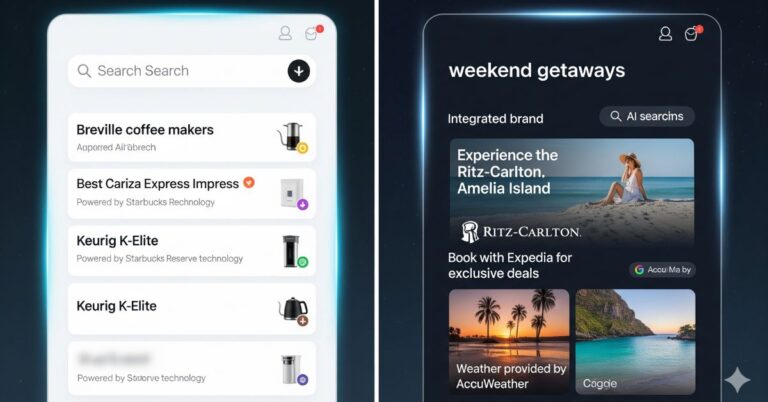
Brand mentions in AI search platforms vary widely, as ChatGPT favors trusted brands from training data while Google AI Overviews delivers broader coverage.
Is your current marketing strategy built for AI-powered search? If your brand is not being mentioned and cited across the right platforms, then you are invisible to the millions of users who now prefer AI results for product discovery.
A groundbreaking study shows that each AI platform has a distinct personality and unique triggers for recommending brands. This research offers a first look into how sellers can gain visibility in this new landscape and turn AI recommendations into a competitive advantage.
New Research Highlights Divergence in AI Brand Recommendations
SQ Magazine"700 million weekly active users now engage with ChatGPT, a 4× increase year-over-year."
A new BrightEdge study reveals brand citation differences between AIO and ChatGPT, and offers insights on how to enhance visibility in both.
BrightEdge analyzed tens of thousands of queries across Google AI Overviews, Google AI Mode, and ChatGPT using its AI Catalyst tool. The study found that brand mentions disagreed 61.9% of the time, with only 33.5% of queries producing the same brand names across all three platforms.
Google AI Overviews averaged 6.02 brand mentions per query, while ChatGPT cited only 2.37. Commercial intent keywords such as “buy,” “where,” and “deals” triggered mentions in 65% of cases, showing these queries still deliver strong visibility for ecommerce. E-commerce and finance were the strongest verticals, achieving 40% or more brand coverage.
Platform-Specific Behavior
- ChatGPT – Tends to cite trusted brands from its training data, even when live search grounding is absent.
- Google AI Overviews – Generates the highest number of brand mentions per query, offering broader coverage.
- Google AI Mode – Selective in citations, favoring fewer but more heavily validated mentions.
This means that the same query can return very different recommendations depending on the AI platform. Sellers must recognize that visibility is now determined by algorithmic preferences rather than uniform search results.
Why These Differences Exist
BrightEdge attributes the variance to three core patterns:
- The Brand Authority Play – Established brands gain mentions in ChatGPT due to historical presence in training data.
- The Volume Opportunity – Google AI Overviews provides multiple slots per query, giving smaller brands a chance to appear.
- The Quality Threshold – Google AI Mode restricts mentions to brands with strong validation, reinforcing authority.
The study notes this isn’t simply about authority signals. Instead, patterns like frequency, prominence, and contextual embedding strength within training data determine whether a brand gets cited.
High-intent keywords triggered brand mentions in nearly two-thirds of queries across all platforms. Comparison queries such as “best” products generated mentions 43% of the time, showing that AI systems interpret query context in ways similar to traditional search.
The Citation Network Effect
BrightEdge highlights what it calls a citation network effect. Earning visibility on one AI platform can reinforce mentions on the others.
- Mentions on ChatGPT build authority through recognition.
- Google AI Overviews rewards comprehensive content with multiple slots.
- Google AI Mode amplifies selective, heavily cited brands.
This creates an interconnected cycle where visibility on one platform can boost presence across others.
SEO Still Matters
Despite the shift, traditional SEO remains critical. BrightEdge found that optimized content directly influences Google AI Overviews and indirectly shapes visibility on ChatGPT and Google AI Mode.
ChatGPT cites from both training and live data, meaning strong brand visibility tied to products and services may carry into future AI training. For sellers, this means content strategy and brand positioning – often guided by a specialized Amazon agency – still hold significant weight.
The study concludes that AI-native brand discovery is reshaping how consumers find businesses. The 62% disagreement rate is not a flaw but a new system of visibility. Brands that adapt to these platform-specific triggers will gain exposure, while those that rely only on traditional search risk falling behind.
LLM Search Expands the Challenge of Brand Visibility
While the BrightEdge study shows how AI platforms differ, other research highlights the growing impact of this trend on user behavior and website traffic. This shift is forcing businesses to reconsider their reliance on traditional search engines for customer acquisition.
From Exploding Topics, a report on a Semrush study examines the rise of Large Language Model (LLM) search. The study projects how AI platforms like Google AI Overviews and ChatGPT will affect business traffic and revenue over the next five years.
LLM search is the practice of using AI chatbots to get direct, conversational answers, bypassing traditional search engine results pages. Unlike link-based results, these platforms provide synthesized information and cite sources for credibility.
This change is significant because it could disrupt the monopoly that search engines have on user intent. If users prefer direct AI answers, the organic search traffic that many businesses depend on could decline sharply.
Key Data on AI Search Adoption
The study provides specific data from March 2025 that illustrates the growing presence of AI in search results. These findings show a clear trend toward AI-integrated search, especially for informational queries.
- AI Overview Presence – 13.14% of all Google queries now generate an AI Overview.
- Query Type – The vast majority of these AI Overviews, 88.1%, are triggered by informational searches.
- User Click-Through – When users see an AI Overview, only 8% of them click through to the source websites.
- Navigational Queries – While least impacted, the number of brand-specific navigational queries triggering an AI Overview doubled from January to March 2025.
This rapid adoption and low click-through rate signal a critical need for businesses to build brand authority. Relying on users to click a link from an AI-generated summary is no longer a sustainable strategy.
Managing Your Brand’s Reputation in AI Search
A Semrush Enterprise analysis published on Martech explains that brands must now proactively manage how they are portrayed in AI-generated responses. If they fail to do so, they risk having their reputation defined by AI models that pull from the vast, and often messy, landscape of online content.
This new reality is especially challenging because of how users interact with AI summaries. Research shows that over 40% of users rarely or never click through to source materials, meaning the initial AI response is often the final word.
Key Risks for Brands in the AI Era
Without a proactive strategy, brands face several significant threats. These issues stem from how AI synthesizes information and the finality of its zero-click answers.
- Inaccurate Portrayal – AI models may surface outdated, negative, or incorrect information about a brand, as 42.1% of users have reported finding misleading content in Google AI Overviews.
- Loss of Narrative Control – An AI can rephrase or “rework” a brand’s carefully crafted messaging in ways that are incorrect or damaging to its reputation.
- Reduced Visibility – If a brand isn’t mentioned clearly and positively, customers will see and choose competitors who are featured in AI responses.
- Erosion of Trust – Association with an unreliable or inaccurate AI answer can cause users to lose trust in the brand itself.
Strategies to Influence AI Brand Mentions
To maintain a positive and accurate presence, brands must actively feed AI platforms the right signals. This involves a combination of content strategy, public relations, and community engagement.
- Target Highly-Cited Websites – Actively seek mentions and engage in discussions on platforms that LLMs frequently reference, such as Reddit, Quora, and reputable industry news sites.
- Encourage Authentic Reviews – Positive sentiment is heavily weighted by AI, so encouraging customers to leave detailed, honest reviews can significantly improve how a brand is portrayed.
- Leverage Digital PR – Pursue positive coverage and build relationships with media and influencers in publications that AI models often cite for your specific industry.
- Create Structured Content – Develop content using clear formats like “best of” lists, FAQs, and step-by-step guides, as these are easy for AI to parse and reference.
Refining Content for AI Readability
Ultimately, if an AI crawler cannot easily understand your content, it will move on to a competitor’s. Therefore, structuring content for both humans and machines is vital for visibility.
Brands should prioritize creating content with clear, concise sections and natural language headings. Vague statements should be replaced with concrete statistics, data, and expert insights that an AI can easily extract and cite.
Demand Sage"As of 2025, over 56% of marketers already use generative AI in their SEO workflows, outpacing even its use in customer service and video creation."





